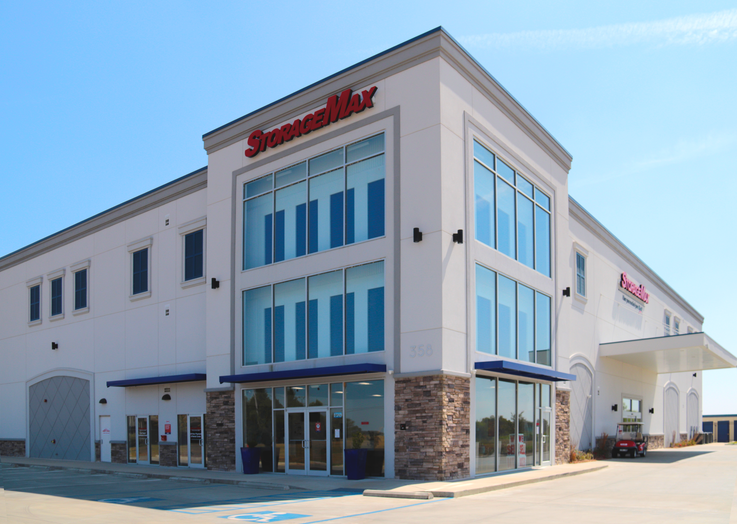Altruism As An Elixir
How The Gary Burnstein Community Health Clinic Is Improving Lives
By Kerri Fivecoat-Campbell
When speaking with Ian Burnstein about the Gary Burnstein Community Health Clinic (GBCHC) in Pontiac, Mich., he will talk about his father, who founded the low-income center. He will also talk about the great staff, volunteers, and patients. He will even talk about his family and the role they’ve played in the clinic’s success.
What he is hesitant to discuss is his own devotion to the clinic, his role in its success, and the personal hurdles he’s had to overcome to continue his work as the president of the board.
People who know him say that’s just who Burnstein is—someone who always gives credit to others without taking any for himself.
In his professional life, Burnstein is the co-founder and principle of Storage Pros Management, a 21-porperty company, as well as co-founder and president of the Storage Owners Business Alliance (SBOA), an organization with 7,000 members that allows owners and operators to get better deals with vendors selling to the industry.
GBCHC certainly isn’t the only iron in the fire of Burnstein’s life, but it is one of the most important. “If you talk to Ian about the clinic, he is just so passionate,” says Emily Shwedel Levin, who is Burnstein’s cousin and has volunteered her dental services at the clinic for about a year. “He treats the clinic as if his own family is being treated there.”
About The GBCHC
Burnsteins’sfather was a cardiologist; one day, in 1997, he received a letter from a minister explaining the healthcare needs of the underserved at a shelter in Pontiac. The letter touched Gary Burnstein, so he began volunteering his services out of the shelter’s closet.
“The minister told my father he sent thousands of letters and he was the only one who responded,” says Burnstein. Gary Burnstein helped low-income people with health services for years, volunteering each Wednesday at the shelter. “He didn’t tell anyone about it, but he was very passionate,” says Burnstein.
After Gary passed away, the family decided to open their own clinic. With $300,000 in seed money, GBCHC was born in 2003. The clinic began seeing hundreds of patients a year; by 2013 it was seeing 1,500 patients per year, providing free medical exams, medicine, and dental care.
GBCHC, which only had 1,500 square feet, was too small for the growing clinic. Burnstein, who is responsible for major fundraising, was able to secure $1.4 million in donations. “Someone asked what we needed, and we told them a building,” says Justin Brox, executive director at GBCHC. “It couldn’t have happened without him. I don’t know how he works his magic, but he calls people and gets the donations.”
Burnstein’s latest large project was securing donations for a new parking lot, which will allow the clinic to provide medical and dental services, as well as educational programs at the same time.
The new 7,200-square-foot building now serves 8,000 patients per year and is a fully functioning, state-of-the-art medical and dental clinic. “I’m just blown away about how technologically advanced it is,” says Shwedel Levin. “Sometimes free clinics don’t offer state-of-the-art facilities, but this is like a private clinic.”
The clinic serves the homeless and low-income individuals who can’t afford private insurance. There is a minimal screening process and income requirements, but no one has to pay. That is thanks to the five employees and dozens of doctors, nurses, dentists, pharmacists, and other professionals who volunteer at the clinic.
“We have every kind of specialty care at the clinic, so people who normally wouldn’t get seen are getting medical treatment,” says Burnstein. “We have a lot of donors who also make sure we have medications such as insulin and blood pressure medication.” The clinic distributes $3 million in free medication. GBCHC diagnoses over 200 new patients each year with diabetes and distributes $1 million of life saving insulin as well as 250,000 blood glucose test strips.
Thanks to their 60 doctors, 50 dentists, and 30 pharmacist volunteers, no one has to wait over 30 days to see a specialist. Recognizing that many patients work more than one job, they also make the appointment process as easy as possible and allow patients to take home medications the same day.
Burnstein is especially proud of the dental services offered, saying he’s seen more than one patient’s life transformed by being able to receive much needed dental work or dentures. “At least 50 percent of people who make less than $40,000 per year haven’t seen a dentist in at least eighteen months,” says Burnstein. “It’s pretty hard to find a job when you don’t have teeth.”
GBCHC doesn’t accept payment from Medicaid and has only received $4,000 in grants from the state of Michigan and some grants from private insurers, so most of the $650,000 annual budget has to be raised through private donations.
One of the largest fundraisers for the clinic is called the Non-Event Event in which donors are asked to stay at home and write a check. “Instead of coming and eating rubber chicken, we have them ‘buy’ a ticket for the non-event,” says Burnstein. The event raised $100,000 last year; $50,000 was raised by matching fund donors.
The major fundraiser of the year is the Esteemed Women of Michigan luncheon, which recognizes women in Michigan who have made a positive impact on the world around them. That event raises $200,000 per year.
Burnstein says he puts in an average of 10 hours per week on clinic business, which is typically working on fundraising. “He connected us with a great pharmaceutical group; he just has a lot of great connections,” says Brox. “Ian is very good at enabling us and this clinic to succeed.”
Burnstein’s family, including his wife Marcy and sisters Dana and Lori, are also heavily involved in volunteering with the clinic. His 13-year-old son recently decided to ask for donations for the clinic, rather than gifts for his Bar Mitzvah. His son raised $32,000. “All of these people were so touched and sent these large checks,” says Burnstein. “I’m very proud of him.”
Personal Challenges
Burnstein has had daunting medical challenges of his own. He was diagnosed 15 years ago with Polycystic Kidney Disease and needed a kidney transplant in July 2017. Burnstein’s wife, Marcy, was going to be the donor, but Burnstein instead received his new kidney from 26-year-old Tyler Westig, who died tragically. His parents, Guy and Jackie, donated Tyler’s organs. Burnstein will be eternally grateful. “I am in constant contact with them and have met them in person,” says Burnstein. “They are wonderful people and Tyler lives with me every day.”
The experience also gave Burnstein another cause for which to give back; he helps raise awareness about organ donation and speaks with other patients facing transplants. Additionally, he and Marcy set up another foundation focused on providing healthcare to the public and opportunities for children, among many other philanthropic endeavors.
Burnstein’s transplant required him to stay at home for three months due to immune system concerns, but he was up and working from home soon after surgery. “I felt better immediately,” Burnstein says.
Burnstein felt better physically, but says helping others, especially in the clinic that helps continue his father’s legacy, is his true elixir. “It’s almost intoxicating,” says Burnstein of his philanthropic work. “It feels great when I can help people, and healthcare is such a basic need in our society.”
Kerri Fivecoat-Campbell is a freelance journalist based in the Ozark Mountains. She is a regular contributor to MiniCo’s publications. Her business articles have also appeared in Entrepreneur, Aol.com, MSN.com, and The Kansas City Star.
More Content
Popular Posts
Recent Posts
When Germantown High School in Gluckstadt,...
It’s comforting to know that no matter how...
A very wise self-storage expert once said...
Senate Bill 709 (SB709) has many in the...
In January, self-storage industry veteran...
In April 1984, the first non-stop commercial...
Raise your hand if you’ve ever made plans,...
Everyone knows it: Investing in real estate...









